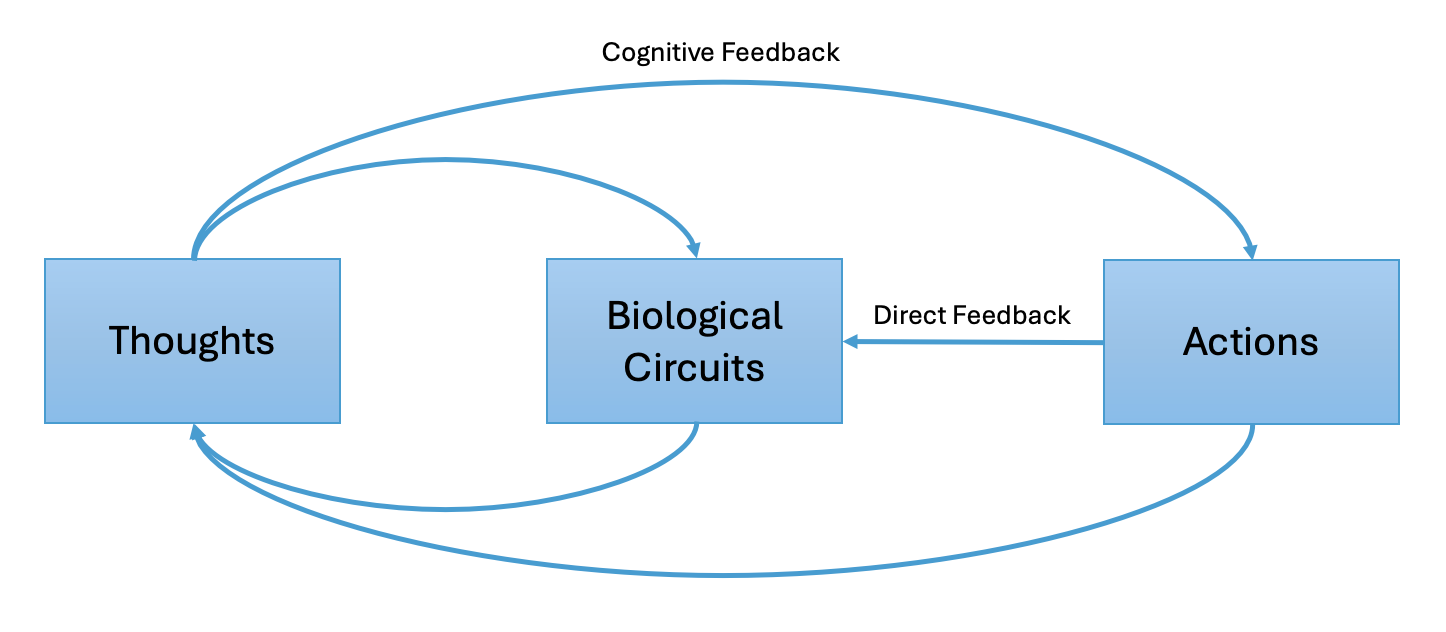Inspiring Brain🧠
What We Think Deternmines What We Can Think

Neurosciecne and psycology have usually been discussed together. After all, I think that one can not go to all the abstract realm of the mind without grounding in a biological system. They have the mutual relationship where thoughts develops the neurological foundations within our brain and later such system we developed effects how we think and feel (i.e. the formation of habits is a great demostration of Hebian plasticity and such system formation).

I have always been facinated by the connections of imperial psycology findings and the corresponding biological mapping delivered by neuroscience, particularly about how our ideas and thoughts may be shaped by the biological circuit behind it, discussing abstract ideas in psycology, but grounded in biology. I believe that with understanding of psycology and neuroscience, we can make better decisions and reach closer to where we want to be at. To some degree, just like practcing muscles, we want to develop a neuronal system that is strong and suitable for what we want. I want to discuss it through the lens of Positive Psycology and the ideas discussed here are drawn mainly from professor Kaiping Peng's class in hundun-academy.
Positive Psycology
Evolution doesn't pick the strongest or the smartest species, but rather those that adapt to changes and cooperate most effectively. It is crucial for us to have the ability to manage our internal state and adapt to fit what the environment need. This is the same as "state flexability" in the context of Allostasis (discussed in the other article). In positive psycology research, people have found these 3 characteristics to be key of adaptation.
- Ability to constantly rise again - Resilience: The capacity to recover quickly.
- Ability to be tenacious - Grit: The ability to endure and persist.
- Post-traumatic growth and development - PTGD: The ability to not only survive but thrive after experiencing hardships and challenges.
I think that there are 3 (2 emphasizing on the abstract level and 1 on the biological detailed level) core aspects (Self Efficacy, Growth Mindset, and Building Neuronal Circuits) that can give an good example of how what we think effects what we do and what we can think later. We don't want to not fail negativity, but rather how to think of it and react towards it.
Self Efficacy
Self-efficacy is the faith that you give to youyrself, which is crucial to the ability to withstand pressure. It is about believeing that you can and you have the ability to succeed. With high self-efficacy, stress and challenges are opportunities to prove yourself. Though self-efficacy is a higher-level abstraction idea, we can use other abstractions to trigger neruonal adaptations, namely:
- Fake it until make it: When thoughts becomes action repeatidly, it becomes habits, then habits becomes more actions, repeated wise.
- Vicarious success: When being accepted by people you want to be, it becomes easier to be these people.
- Unexpected social support: Evolution favors cooperators (the strong effect of weak ties). Opportunities are usually brought by people that you wouldn't expect.
- Simulated practice: One of the greatest power of the human brain is our predictive ability. Our brain can envision the future or jump around dimensions neglecting the effect of time. When the brain is under the default mode/circuit (a mode when you are not exactly thinking about anything and just being "board", i.e., during shower), it constantly makes predictions, processes emotions, conduct introspects, at a level beneath cognition. With such ability, we can escape the realm of "reality" to travel in much more abstract space.
- We can conduct "visualization", to mentally imagine success. The more you envision, the clearer the intention (mirror cell effect as well).
- Instead of focusing on details, see the bigger picture, the global properties.
Growth Mindset
A growth mindset, as contast to a stationary mindset, is a belief believing that only attitude and effort determine what can be learned, where risks and challenges are enjoyed and self-feedback/suggestions determines outcomes. Th greatest hinders to a grwoth mindset is The burden of excellence where people believe in that they "should be something" instead of they "could be something". This can can lead to negative feelings (below the standard line), while "earned through effort" provides positive feelings. A growth mindset believes that there is no “should,” no “should be good at learning” or “should be smart,” risks and challenges bring new outcomes.
- Process-oriented: Self-assessment standards should be process-oriented, not outcome-oriented, R&D is about challenges and risks (Success should be measured by changes, just as dopamine does). Instead of saying that an event is "impossible to achieve", frame it as "not yet", or "maybe try more later".
- Telling of the story makes the story: The stories we weave causes physical and mental reactions that we felt
- Activating event -> Belief -> Consequences: A cannot be changed, but B can, hence C changes. Use the prefrontal cortex to refute B's thoughts.
- Remanber that the failing to acknowledge negative aspects means missing out on positive experiences; the two are interconnected. One cannot achieve positivity without ubnderstadning negativity.
Thoughts to Biological Circuits and Vice Versa
It's not the event itself that matters, but rather the perspective and the interpretation of it, attitude determines actions and reality. A positive cognition would deliver a physical and mental state that is full of vitality and makes it easier to see the goodness in humanity. However, it is impossible to not feel negative emotions. Hinders of feeling negativity causes unhealthy connections between Amygdala and PFC, causing potential development of being a psycopath. With that being said, we can use our understanding of neuroscience to navigate what we can do when negative feeling strikes, the key is always to adapt to changes that the environment poses and regulate our internal feeings/mental state, what we think effects the biolgical mechanism of teh brain and such system effects how we think.
- Physical cooling: The amygdala is located behind the nose and its activation represents congestion with temperature rises. When inhaling cool air, we physically cool down the amygdala and lowers its activations.
- Celebrate success: Prolong the time of happiness, after four minutes, memory conslolidates and the physiological pleasure neural network is formed (remember, later watching is equivalent to doing in the eyes of neuronal mechanisms).
- Neurologically "proactive": Use positive neurotransmitters to form positive neuro-emotional networks. Psychological activity isn't a single point, but an interconnected area.
- Dopamine: Released when helping others, discovering self-strengths, experiencing self-worth, doing what others cannot.
- Serotonin: Released when protecting self-esteem or basking in the sun.
- Endorphins: Happiness from deeper thinking or delayed gratifications.
- Oxytocin: Giving feel of love. released by warm hugs, receiving and giving compliments, or engaging in empathetic, understanding, appreciative, and supportive conversations.
- Habitual behaviors: Humans easily fall into habitual behavior, to act automatically without thinking. When challenges arise, habits become instincts, and instincts serve as an important protective mechanism.
- Build default immersive circuits: Find your own Flow and immerse in it to experience deep engagement (as what we say in chinese: 沉浸其中,物我两忘,酣畅凌厉,如痴如醉). With such an system build and reinforced by Basal Ganglia, doing more of it is much easier.
Evolution of a Desirable Circuits: Habitization
Building a circuit against stress is a process similar to evolution, we are keep trying to construct better and better neuronal systems. We need to use all possible methods at hand to build a desirable neuronal cuirtuit during moment of stress to react to it at the moment and also build foundations for later reactions. With more of such response, habitual circuits would be formed and reaction to stress or challenges later would be as simple as instinct.
Matching on the thoughts levels than reality will follow. Think about the person that you want to be, imagine what this person would do and do it, act like him/her and align your thinking on an abstract level first. Every single little small thing that you do like this person would prove a bit mroe that you are this person. As the bricks lays and as time goes on, you become this person.